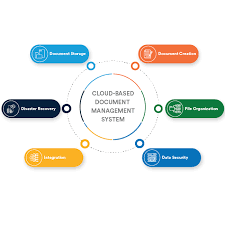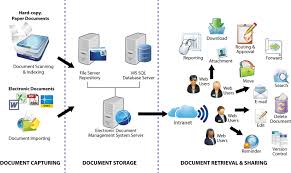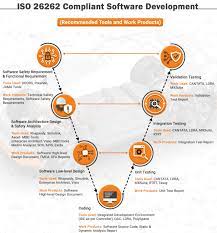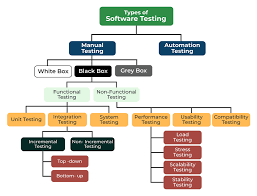Understanding Software Development Models
The Importance of Software Development Models
Software development models are essential frameworks that guide the process of creating software applications. These models provide a structured approach to software development, helping teams organize their work, manage resources effectively, and deliver high-quality products on time.
Types of Software Development Models
There are several popular software development models used in the industry today, each with its own unique characteristics and benefits:
- Waterfall Model: A linear sequential approach where each phase must be completed before moving on to the next.
- Agile Model: Emphasizes flexibility, collaboration, and iterative development cycles.
- Spiral Model: Combines elements of both waterfall and iterative development in a risk-driven approach.
- Incremental Model: Divides the project into small increments that are developed and delivered incrementally.
- V-Model: Corresponds to the testing phase for each development stage in a sequential manner.
The Software Development Process
The software development process typically includes the following key stages:
- Requirement Analysis: Gathering and analyzing requirements from stakeholders.
- Design: Creating a blueprint for the software based on the requirements.
- Implementation: Writing code according to the design specifications.
- Testing: Verifying that the software functions correctly and meets requirements.
- Deployment: Releasing the software for users to access and utilize.
Selecting the Right Model
The choice of software development model depends on various factors such as project requirements, team size, budget constraints, and timeline. It is crucial for organizations to evaluate these factors carefully to select a model that aligns with their goals and objectives.
In Conclusion
In conclusion, software development models play a vital role in guiding teams through the complex process of creating software applications. By understanding different models and selecting the most suitable one for each project, organizations can enhance collaboration, improve efficiency, and deliver successful products that meet user needs effectively.
9 Benefits of a Structured Software Development Model for Effective Project Management
- Provides a structured approach to software development.
- Helps in organizing and managing the development process efficiently.
- Facilitates better resource allocation and utilization.
- Enables teams to plan and execute projects effectively.
- Improves communication and collaboration among team members.
- Enhances transparency by defining clear project milestones and deliverables.
- Allows for better risk management through systematic planning.
- Promotes quality assurance by incorporating testing at various stages of development.
- Supports iterative improvement based on feedback and evaluation.
Challenges of a Rigid Software Development Model: Balancing Structure and Flexibility
- Rigid structure may limit flexibility in responding to changing requirements.
- High initial planning and documentation requirements can be time-consuming.
- Difficulty in estimating project timelines accurately due to inherent uncertainties.
- Risk of scope creep if requirements are not well-defined at the beginning.
- May lead to stakeholder dissatisfaction if deliverables do not align with evolving expectations.
- Transitioning between different models can disrupt team dynamics and project continuity.
Provides a structured approach to software development.
One significant advantage of software development models is their ability to provide a structured approach to the entire software development process. By following a predefined framework, teams can organize their tasks, set clear milestones, and establish a systematic workflow. This structured approach helps in better resource management, improved coordination among team members, and ensures that the project progresses in a logical sequence. Ultimately, having a structured software development model in place enhances efficiency, reduces risks of errors, and increases the likelihood of delivering high-quality software products within the specified time frame.
Helps in organizing and managing the development process efficiently.
One key advantage of software development models is their ability to help in organizing and managing the development process efficiently. By providing a structured framework for project planning and execution, these models enable teams to streamline workflows, allocate resources effectively, and maintain clear communication throughout the development cycle. This organization ensures that tasks are completed in a systematic manner, leading to improved productivity, reduced risks of errors, and ultimately, successful delivery of high-quality software products within the specified timelines.
Facilitates better resource allocation and utilization.
One significant advantage of software development models is that they facilitate better resource allocation and utilization. By providing a structured framework for the development process, these models help teams effectively allocate resources such as time, budget, and manpower. This streamlined approach ensures that resources are utilized efficiently, leading to improved productivity and cost-effectiveness throughout the software development lifecycle. Additionally, by clearly defining roles and responsibilities within the team, software development models enable organizations to optimize their resources and maximize output while maintaining quality standards.
Enables teams to plan and execute projects effectively.
Software development models provide a structured framework that enables teams to plan and execute projects effectively. By following a defined process with clear milestones and deliverables, teams can establish a roadmap for project completion, allocate resources efficiently, and track progress methodically. This approach fosters better coordination among team members, ensures that tasks are completed in a logical sequence, and helps mitigate risks by identifying potential issues early on. Ultimately, the use of software development models empowers teams to work cohesively towards project goals and achieve successful outcomes within the specified timelines.
Improves communication and collaboration among team members.
Effective software development models contribute to improved communication and collaboration among team members. By providing a structured framework for project planning and execution, these models help team members clearly understand their roles, responsibilities, and dependencies. Regular meetings, status updates, and feedback sessions facilitated by the model promote open communication and foster a collaborative environment where ideas can be shared, issues addressed promptly, and solutions developed collectively. This enhanced communication ultimately leads to increased productivity, better decision-making, and a stronger sense of teamwork within the development team.
Enhances transparency by defining clear project milestones and deliverables.
Enhancing transparency by defining clear project milestones and deliverables is a significant advantage of software development models. By establishing specific goals and checkpoints throughout the development process, team members, stakeholders, and clients gain a clear understanding of the project’s progress and expected outcomes. This transparency fosters better communication, alignment of expectations, and accountability, ultimately leading to more successful and efficient project execution.
Allows for better risk management through systematic planning.
One significant advantage of software development models is their ability to facilitate better risk management through systematic planning. By following a structured approach outlined by the chosen model, development teams can identify potential risks early in the process, create mitigation strategies, and allocate resources effectively to address any uncertainties. This proactive risk management approach helps minimize the impact of unforeseen challenges, enhances project predictability, and increases the likelihood of delivering high-quality software within the defined timeline and budget constraints.
By incorporating testing at various stages of development, software development models promote quality assurance effectively. This proactive approach allows for the identification and resolution of potential issues early on in the process, ensuring that the final product meets high standards of quality and functionality. By integrating testing throughout different phases, teams can address bugs and errors promptly, leading to a more robust and reliable software application upon completion. This emphasis on quality assurance not only enhances the overall user experience but also contributes to the long-term success and sustainability of the software product.
Supports iterative improvement based on feedback and evaluation.
One significant benefit of software development models is their support for iterative improvement based on feedback and evaluation. By incorporating feedback from stakeholders and evaluating the software at various stages of development, teams can identify areas for enhancement and make necessary adjustments promptly. This iterative approach allows for continuous refinement of the product, ensuring that it meets user requirements effectively and delivers a high level of quality.
Rigid structure may limit flexibility in responding to changing requirements.
One significant drawback of software development models with a rigid structure is that they can limit flexibility in adapting to changing requirements. When the development process follows a strict sequential path, it becomes challenging to accommodate modifications or new priorities that may arise during the project. This lack of agility can lead to delays, increased costs, and potential dissatisfaction among stakeholders as the software may not fully meet their evolving needs. To mitigate this con, teams must carefully consider the trade-offs between structure and adaptability when selecting a development model and be prepared to implement strategies for managing changing requirements effectively.
High initial planning and documentation requirements can be time-consuming.
One significant drawback of software development models is the high initial planning and documentation requirements, which can be time-consuming. This con often leads to delays in the project timeline as teams invest considerable effort in detailed planning and documentation before moving forward with development. While thorough planning is essential for project success, excessive focus on documentation at the beginning stages can slow down progress and hinder agility in responding to changing requirements or market demands. Balancing the need for comprehensive planning with the flexibility to adapt to evolving circumstances is crucial to mitigating this challenge and ensuring efficient software development processes.
Difficulty in estimating project timelines accurately due to inherent uncertainties.
One significant drawback of software development models is the challenge of accurately estimating project timelines. The presence of inherent uncertainties, such as evolving requirements, unforeseen technical challenges, and changing priorities, can make it difficult to predict the exact duration needed to complete a project. This uncertainty can lead to delays, budget overruns, and frustration among stakeholders as initial timelines may need frequent adjustments throughout the development process. Effective project management strategies and regular communication with all involved parties are essential to mitigate this con and ensure successful project delivery despite these uncertainties.
Risk of scope creep if requirements are not well-defined at the beginning.
One significant drawback of software development models is the risk of scope creep when requirements are not well-defined at the project’s outset. Scope creep occurs when additional features or changes are continuously introduced throughout the development process, leading to project delays, increased costs, and potential conflicts within the team. Without clear and detailed requirements established from the beginning, it becomes challenging to manage stakeholders’ expectations and maintain project focus, ultimately jeopardizing the project’s success and overall efficiency.
May lead to stakeholder dissatisfaction if deliverables do not align with evolving expectations.
In software development, one significant drawback of using a specific model is that it may lead to stakeholder dissatisfaction if the deliverables do not align with evolving expectations. As requirements and priorities can change throughout the development process, rigid models that do not easily accommodate modifications may result in discrepancies between what was initially planned and what stakeholders ultimately desire. This mismatch can lead to frustration, delays, and potential rework, highlighting the importance of flexibility and adaptability in software development methodologies to ensure stakeholders’ evolving needs are met effectively.
Transitioning between different models can disrupt team dynamics and project continuity.
Transitioning between different software development models can pose a significant challenge for teams as it has the potential to disrupt team dynamics and project continuity. When moving from one model to another, team members may need to adjust their working methods, communication processes, and overall approach to development. This transition period can lead to confusion, delays, and a temporary decrease in productivity as team members adapt to the new model. Additionally, changes in project management practices and workflow structures can impact the overall continuity of the project, potentially causing setbacks and affecting the quality of deliverables. It is essential for organizations to carefully plan and manage transitions between software development models to minimize disruptions and ensure a smooth continuation of project activities.











